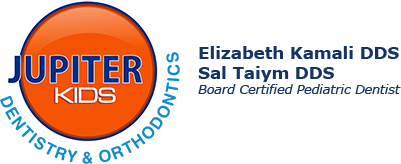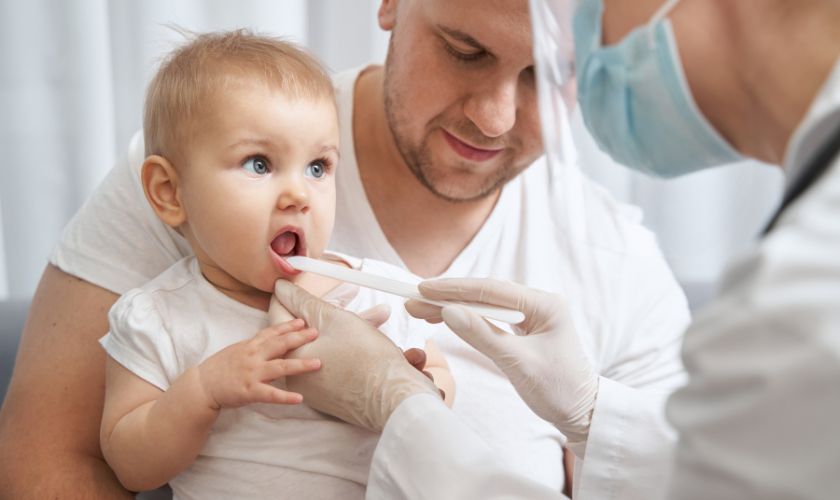Keeping your infant’s mouth healthy is essential for overall health and well-being. Healthy oral habits should be established from the start as good dental practice will help prevent cavities as your child grows up. Here are 9 pro tips to keep your infant’s mouth healthy.
Regular Oral Exams
The American Dental Association and American Academy of Pediatric Dentistry recommends that children have their first visit to the dentist by age 1 or shortly after their first tooth erupts. It is important to establish a relationship between the dentist and the patient early on. During this appointment, your dentist can also give you tips on how to properly care for your baby’s teeth and gums.
Brush Teeth Twice a Day
As soon as teeth begin to appear in the mouth, it is important to brush them twice a day with an infant-sized soft-bristled toothbrush and water only (no toothpaste). Once the child reaches 1 year of age, you can begin using a rice-size amount of toothpaste with fluoride in it—but no more than that!
Floss Regularly
Flossing helps remove plaque from between teeth, which brushing alone cannot do. For infants who don’t have any teeth touching each other yet, you can use an infant flosser or wrap some floss around your finger and gently swish it around the gum line. This will help stimulate the gums and get them used to floss when they do get more teeth.
Limit Sugary Drinks
Sugary drinks such as juice, soda, sports drinks, and energy drinks can cause damage to young teeth due to their high sugar content. Try substituting these sugary drinks with water or milk instead for healthier options for their growing mouths.
Avoid Finger/Pacifier Sucking
If possible, try not to let your child continue sucking their fingers or pacifiers past 1-2 years old as this can cause problems with tooth development down the road. When babies are born they naturally suck on anything they come into contact with since it helps soothe them—but it is important for parents to wean them off this habit before permanent damage occurs.
Clean Pacifiers Thoroughly
If you choose not to have your baby stop sucking on a pacifier, make sure that you clean it regularly in order to avoid any bacteria buildup that could affect their oral health over time. Boiling the pacifier in hot water every few days should do the trick!
Decrease Bottle Feeding Time
While bottle feeding can be comforting for babies at night before bedtime, extended periods of time spent drinking out of a bottle greatly increases risk of cavities due to prolonged exposure of liquid containing sugar (i.e., formula) in contact with baby’s teeth over long periods of time throughout the night while sleeping. If possible, try giving younger infants only water at night instead of formula or breastmilk if they tend wake up multiple times throughout the night looking for comfort from drinking out of a bottle during those moments; this should help reduce risk for cavities due to prolonged exposure time with sugary liquids against baby’s teething surfaces while sleeping at night;
Conclusion
Establishing healthy oral habits from birth is essential for optimal dental health now and into adulthood! Following these tips will ensure our little ones’ mouths stay healthy throughout childhood and beyond! With regular checkups at our local dentist office combined with proper cleaning techniques recommended by our dentists here at Jupiter Kids Dentistry & Orthodontics, we’ll be sure our little ones keep smiling through toddlerhood all the way until adulthood!
The most important tips to keep an infant’s mouth healthy include avoiding sugary foods and drinks, brushing their gums with a soft-bristle toothbrush, using toothpaste and mouth rinse, scheduling regular dental visits, and limiting pacifier use.
You should start cleaning your baby’s gums as soon as they erupt with a soft damp cloth or silicone finger brush after meal times. As soon as your baby gets their first tooth start brushing twice a day with a soft bristled toothbrush and water.
The best way to prevent cavities in an infant’s teeth is to limit their intake of sugary drinks and foods, brush their gums with a soft-bristle toothbrush, use fluoride-free toothpaste and mouth rinse, schedule regular dental visits for checkups and cleanings, and limit pacifier use.


